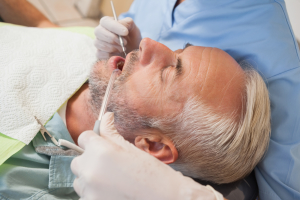How Sedation Dentistry Can Help You Feel More Comfortable at the Dentist

Did you know that upwards of 20% of Americans don’t see the dentist unless absolutely necessary due to anxiety and fear? Unfortunately, not seeing your dentist can lead to some serious consequences and more expensive and painful trips to the dental chair. You want to be seeing your dentist on a regular basis so you can ensure your mouth is healthy.
If you have an extreme fear of seeing the dentist, it may not seem worth it to go. What if there were a way to overcome that fear and feel relaxed in the dentist’s chair? With sedation dentistry, you can feel both relaxed and anxiety free. Let’s take a look at how sedation dentistry can help you feel more comfortable at the dentist.
What is Sedation Dentistry?
First, you should know exactly what sedation dentistry is in order to know how it can help you. Sedation dentistry uses sedatives to calm and relax you while in the dentist’s chair. Sedatives can be administered in a variety of ways, depending on your medical history and preference. Various methods include:
- Oral Sedatives: Oral medication can be given the night before a procedure is to be performed or an hour before the procedure, depending on how anxious you get. These are easy to take and are effective at relaxing you, but they don’t take any edge off the pain. As such, your dentist will also administer local anesthesia to numb the pain.
- IV Sedation: Intravenous (IV) sedation involves the dentist injecting the sedative directly into your veins. This often takes effect much quicker than oral sedatives, but it still doesn’t provide any pain relief, so you will also receive local anesthesia with IV sedatives.
- Nitrous Oxide: This type of sedation is also known as laughing gas, and it is administered via inhalation. Your dentist will put a mask over your nose and mouth where the gas will be administered. This induces a state of relaxation, but doesn’t provide any pain relief.
- General Anesthesia: This sedation will put you to sleep throughout the entirety of the procedure. Typically, the anesthesia will be administered through an IV and you won’t be aware of anything happening to you. As such, the need for local anesthesia is taken out of the equation.
Talk to Your Dentist
If you think you might benefit from sedation dentistry, talk to your dentist about the options available in his or her office. Some dentists prefer to only work with a specific type of sedation, while others specialize in all kinds of sedation. In the end, you want to make your visit to the dentist as relaxing as possible. If your dentist can provide you with a solution that works for you, then go ahead and try it to see if it helps.
Ultimately, you want to take care of your teeth and you want to be comfortable with your smile. Your dentist wants to help you achieve these goals, and if you are being held up because of your fear and anxiety, dental sedation may be the best solution for you. Talking to your dentist can help calm your fears and give you a better sense of a solution that will work.
